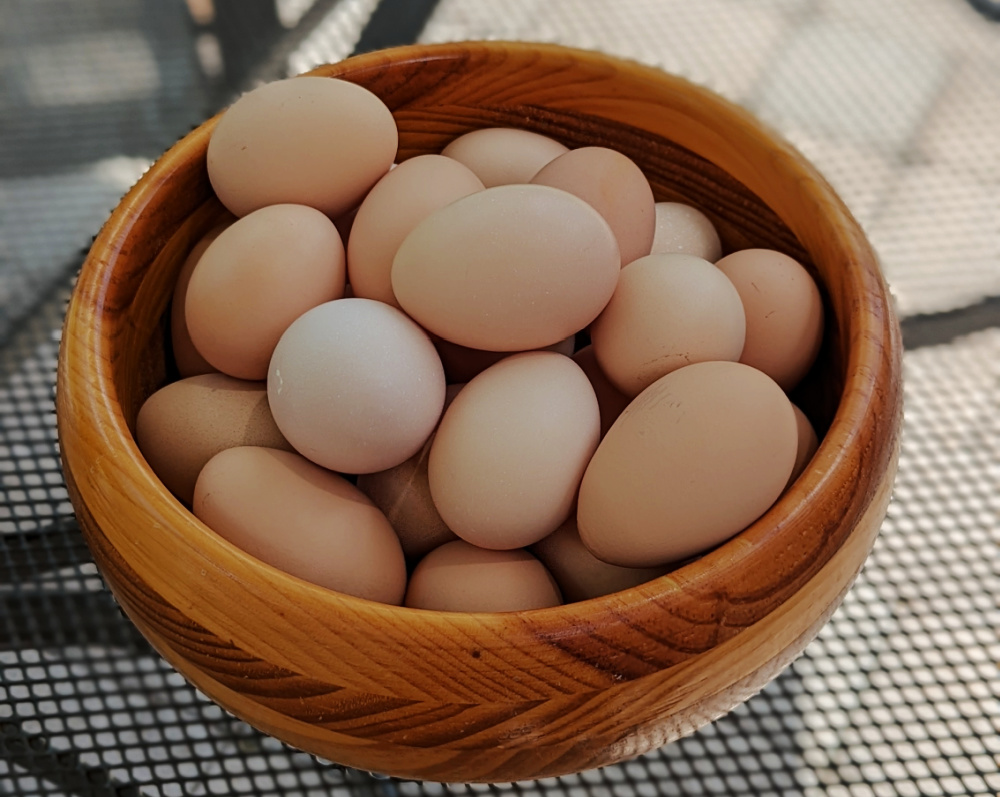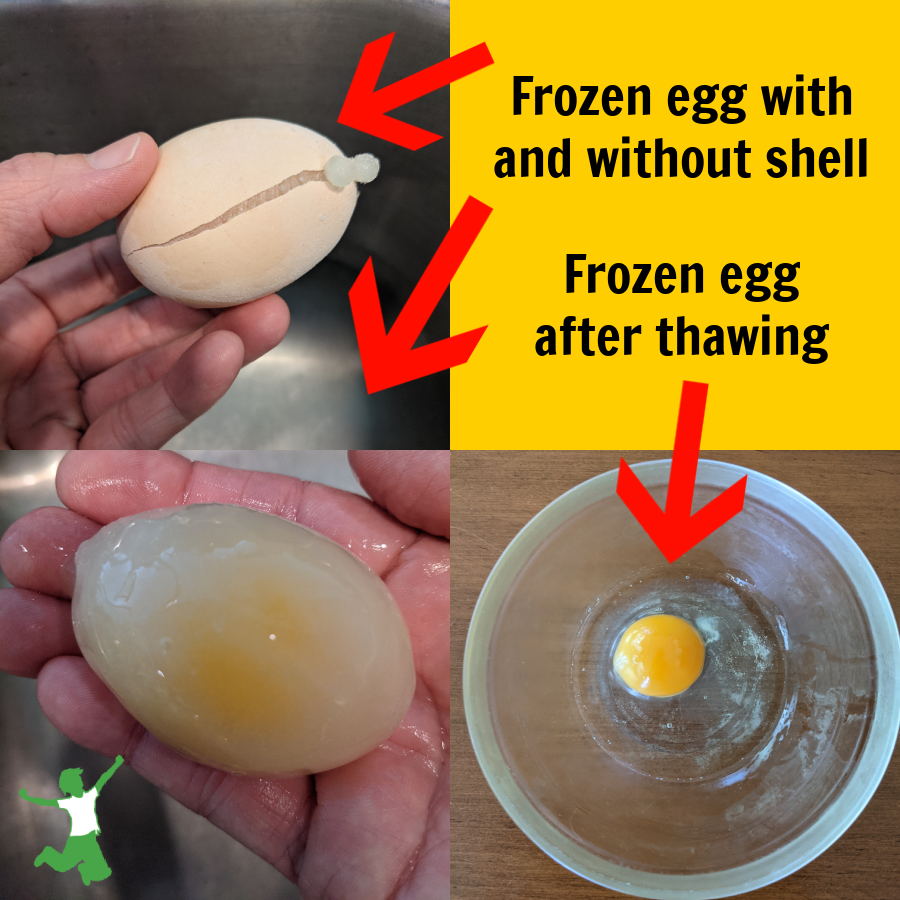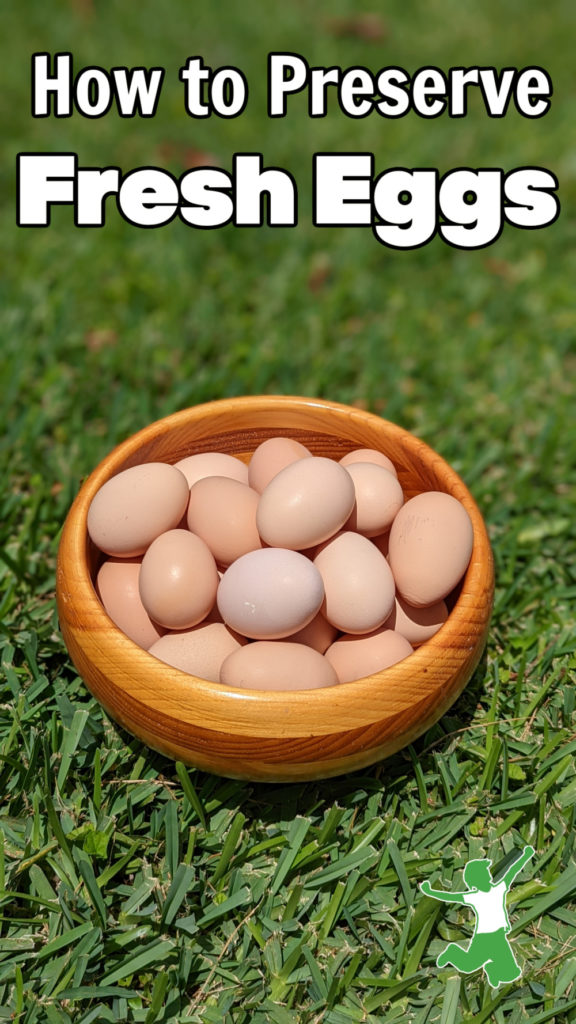Table of Contents[Hide][Show]
The best methods for preserving and storing fresh eggs in the refrigerator or freezer for use a few weeks, months, or even a year later.

Spring and summer are the times of year when backyard hens are typically at their peak egg production.
Things start to slow down in the autumn months to the point where the girls usually stop laying, molting and resting for an average of three months.
You can keep them laying year round by putting a 24/7 light in their coop. However, I don’t do this because it is highly unnatural and cruel. It also shortens their lifespan tremendously.
Thus, when chickens are at their peak productivity, you may find an overabundance of eggs that you can’t use up right away.
We have a practice of giving eggs away to neighbors and friends who would enjoy them. However, we are fortunate to still have plenty to store for use when egg production is low.
I thought I would share with you my three main methods for preserving eggs whether you have the luxury of your own little flock or buy at the farmer’s market and health food store.
Refrigerate
Preservation timeframe: up to 3 months
Fresh eggs have a protective layer called a bloom or cuticle on the outside of the shell.
This translucent coating very effectively seals off the pores of the shell.
This natural protection prevents bacteria from getting inside. It also reduces moisture loss, which preserves freshness.
These characteristics allow for safe storage on the counter without refrigeration.
This natural protection also means that if you have fresh eggs that need to be preserved longer than a week or two, you can simply put them in a bowl and refrigerate.
No washing is necessary if they are clean without any debris right out of the coop.
Note that commercial eggs do not have this protective cuticle.
Sadly, factory processing washes it away with toxic solutions before packaging. Even organic eggs are exposed to a chemicalized bath as chlorine is permitted for use by USDA standards.
This is why commercial eggs do not last months in the refrigerator like fresh eggs do.
Wash, Seal and Refrigerate
Preservation Timeframe: up to 3 months
Occasionally, eggs will have dirt or debris on them coming out of the coop.
This is commonly due to hens getting mud on their feet during wet weather. Another cause is a delay in freshening up the coop bedding which can increase manure exposure.
In this situation, the eggs should be washed in mild soap and warm water.
Unfortunately, the necessity of cleaning them also removes the protective bloom.
The good news is that there is a way to compensate.
After washing and drying, simply coat each egg with a small amount of extra virgin olive oil. Then, wipe away the excess with a clean cotton towel.
The oil will seal the shell’s pores in a manner similar to the protective cuticle. These sealed eggs will last in the refrigerator for around the same length of time as refrigerated fresh eggs that still have the bloom on them.
You can also use this method for eggs you purchase that have already been washed.
I suggest re-washing yourself with mild soap and filtered water before applying the protective oil coating. This prevents sealing in the chemicals the eggs were exposed to during the mandated cleaning at the factory.
How to Freeze Fresh Eggs
Preservation Timeframe: 3 months – 1 year
Most people do not realize that you can freeze fresh eggs with the shell!
Some websites suggest cracking the eggs, blending the yolk and white together, and then freezing individual eggs in ice cube trays.
That is a lot of unnecessary work!
Why would you ever remove the shell, the best protection for the edible portion there is?
If you have fresh eggs with the bloom intact, all you have to do is put them in a heavy-duty bag and place them in the freezer.
That. Is. It.
If you have farmer’s market eggs or eggs from your backyard flock that are washed, then seal with a film of EVOO as described above and then freeze.
The shell may or may not crack in the freezer. It doesn’t matter either way.
Surprisingly, the inside of the egg freezes before the shell cracks!

Thawing a Frozen Egg
When you need to use a frozen egg from the freezer, simply remove the shell first after letting the egg sit on the counter for a few minutes.
If the frozen egg already has a big crack, peeling the shell is a bit easier.
You will have an intact egg white and yolk that is still frozen after removing the shell as you can see from the above picture.
Place peeled frozen eggs without the shell in a bowl and leave in the refrigerator for a few hours.
Once thawed, they will be in a similar state as before freezing and ready to use.
Note: there is some texture loss similar to what happens to cream when you freeze and thaw fresh grassfed milk.
What about Water Glassing?
I do not suggest water glassing of fresh eggs as commonly recommended on homesteader websites.
The reason is that the pickling lime that is used is so caustic.
I am currently testing another method that is similar to water glassing but uses a safe and nontoxic substance.
Stay tuned for my results! This method can potentially preserve the egg texture better than freezing for long term storage.









If you submerge clean eggs in an edible oil which resists oxidation, such as refined (liquid) organic coconut oil, they’ll last indefinitely. No oxygen will reach the eggs, therefore they won’t oxidize/go bad.
Where did I learn this? From a news report about a shipwreck discovered at the bottom of the Mediterranean Sea. Among the bounty were several large ceramic urns sealed with wax. When opened, the researchers were astounded to find eggs submerged in olive oil. The olive oil wasn’t rancid (because of having been sealed, and kept at cold temperatures) and one brave researcher did the water-floating test on an egg, found it didn’t float, and then cooked and ate it! After 2,000 years the eggs were still edible.
This doesn’t work on washed store eggs from what I understand.
The reason I freeze egg yolks is because I need the whites, and can’t always use all the yolks. I use the rule 1/8 tsp salt per 4 egg yolks, or 1 1/2 teaspoons of sugar (or allulose) to beat them and store in silicon cups, sometimes transferring to parchment paper in flat bag if I need the molds.
Thank you, Sarah
Please let us know, the only reason I haven’t waterglassed fresh eggs is I wasn’t sure if it could get into the egg. I know we need to preserve the good we do have while we can find it ?
I tried waterglassing with Dolomite powder (nontoxic form of lime used to make limewater for soaking corn) and unfortunately, it failed. Given the toxicity of pickling (caustic) lime (calcium hydroxide) for waterglassing, I am continuing to not recommend this option.